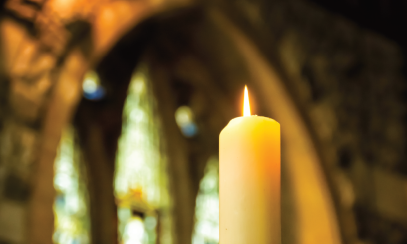Why do we believe in heaven, hell and purgatory if they aren't in the Bible?
I heard a great story the other day about two judges who were in an accident. They were both speeding and the arriving police officer informed them that they had to go to court. So, they decided, why not try each other? They quickly found an empty courtroom and started. The first judge got up and said, “Well, I have reviewed the facts of the case and fine you $1.” The second judge nodded, took his seat and said, “I have reviewed the facts of this case and fine you $750.” The first judge was flabbergasted! “I fined you a dollar and you do this? What's going on?” The second judge said,
“You don't understand; this is becoming quite a problem. Why, this is the second case of speeding we've heard of today!”
Sorry about that one. Judging. It’s a big one and it ties into this month’s question about salvation.
Fr. Joe, I have a friend who is Protestant and who is constantly telling me that our beliefs about heaven, hell and especially purgatory are not biblical. I looked, and she is right. It’s not in the Scriptures. Why do we believe that if it’s not in the Bible?
Great question! This really taps into two areas of our difference with our Protestant brothers and sisters, so we will take it one at a time. I need to point out that I have a limited amount of space here, and am not going to be able to cover this adequately enough for some. Please consult your catechisms for the full blown discussion, particularly sections 80-87.
First, the “non-Biblical” issue. As Catholics, we do not believe that Scripture alone covers everything; we also believe that we need something we call “Sacred Tradition.” Now, this tradition is not like “let’s have turkey at Thanksgiving!” It’s more than that. Sacred Tradition is, in the words of the CCC (# 81) “[the transmission] in its entirety [of] the Word of God which has been entrusted to the Apostles by Christ the Lord and the Holy Spirit.” Where do we get this authority? From the handing on by the Apostles of teachings that are not in Scripture. This also covers those teachings that come about as a result of modern issues.
Look at it this way: where do Scriptures get their authority? Who decided what books “made the cut” into the Bible? Paul wrote other letters. Other Gospels were written. Who decided which ones were authentically from the Apostles and which ones were written by others? Sacred Tradition did. Sacred Scripture is a collection of books that the Apostles and their successors said were consistent with what Jesus said and taught. These books have no authority if they are not recognized by the Apostles and their successors. So, we used Sacred Tradition to tell us which books were divinely inspired and which books were not. Because of this, we cannot disregard Sacred Tradition without disregarding the authority of Scripture. As Catholics we embrace them both.
Let’s look at what we believe about heaven, hell and purgatory. First of all, we believe that heaven, hell and purgatory all start here on earth. All three are natural consequences of our choices. Catholics believe that God always respects the consequences of our choices, and the three of these bear out those choices for eternity ... kind of. Read on.
Heaven: Heaven is being with God and all that this entails. Perfect love, joy and peace. No more pain, sorrow, rejection, anger – only perfection with Christ. It is the place where we become what we have been created to be: one with God. Heaven is the fire of God’s presence. We are used to hell being described as a burning place, but in actuality, the best description of heaven is that of fire. God IS love and God’s presence is a burning, consuming fire.
As we draw closer to that fire, that which is not authentic, that which is not a part of what we were created to be, gets burned up, and that can be painful. Thus, we have purgatory.
Purgatory is God’s severe mercy. Despite the fact that we may, while on earth, desire to be with God, we still make terrible mistakes. We sin, hurt others and neglect God and our faith. When we do this, we accumulate on our souls the consequences (the dirt) of sin. As we draw closer to God, those things need to burn up so that we can be the pure gold, without stain or defect.
This process is called purgation–purgatory. We believe it can happen on earth and definitely happens at our death. Once in purgatory, we are going to heaven, because while our “yes” to God may be imperfect, it is a “yes,” and He’ll take it!
Hell. Yikes! This begins on earth with the pain we feel when we neglect our relationship with God. It is the consequence of a life spent seeking our own way and the pleasures of the world as opposed to God’s way. When we spend our lifetime ignoring or hating God, we have chosen to be separated from Him. At our death, God respects that choice and does not make us live with Him. Thus, we have hell. The pain in hell is not so much physical as it is spiritual. Our souls are made to be with God and in hell, we are separate. That’s what makes hell so bad.
Whew! That was a lot of information. Be sure and check your catechisms on these. There is so much more to say. Here are the sections: heaven (1729, 1821, 2796), hell (1034 -1037), purgatory (1030-1032).
Enjoy another day in God's presence!



